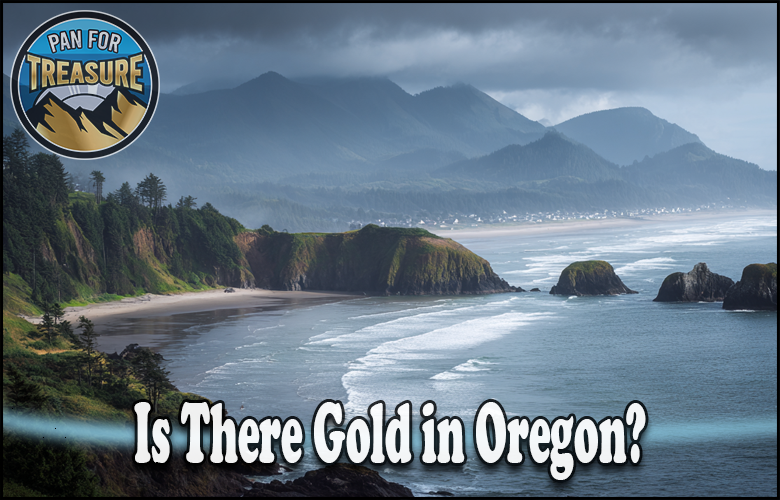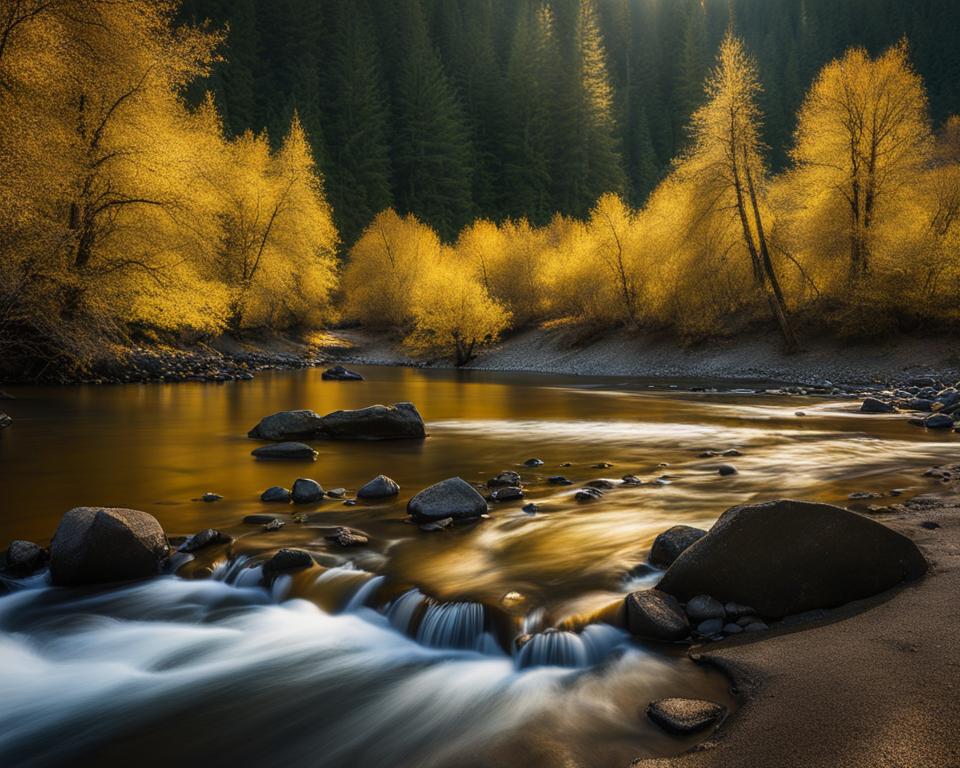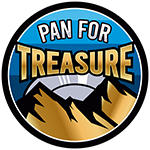
Disclosure: This Post Contains Affiliate Links; We earn a commission on purchases.
Oregon, known for its picturesque landscapes and natural wonders, also has a rich history of gold mining.
Since the 1850s, when the first gold nuggets were discovered, the state has seen a fascinating gold rush, the rise and fall of mining towns, and significant environmental impact.
Today, Oregon continues to attract gold prospectors from far and wide, offering ample opportunities for those eager to seek their fortune.
Key Takeaways:
- Oregon has a rich history of gold mining dating back to the 1850s.
- The period of the richest mining in Oregon was between the 1850s and 1880s.
- Oregon’s gold rush attracted miners from California and around the world, leading to the establishment of mining towns.
- The state offers numerous spots for gold prospecting, including streams and rivers.
- Popular gold mining areas in Oregon include the Upper Burnt River district, the Greenhorn district, and the Illinois River district.
The Gold Rush in Oregon
The gold rush in Oregon, which began in the 1850s, attracted miners from all over the world, as well as American prospectors from California and the Willamette Valley. These fortune seekers flocked to Oregon in search of gold, leading to the establishment of whole towns dedicated to mining.
Initially, these mining camps consisted of tents and basic structures, but as the gold rush intensified, they evolved into vibrant and bustling cities made of brick and timber. The gold rush in Oregon brought significant economic and social changes to the state, shaping its history and leaving a lasting legacy.
“The gold rush in Oregon transformed the landscape and the lives of those who participated in it. Whole communities sprang up overnight, driven by the promise of wealth and prosperity.”
Impact on Oregon
The gold rush had a profound impact on Oregon’s development. The influx of miners and settlers led to the rapid growth of towns and infrastructure, as well as the establishment of businesses catering to the needs of the mining community. The gold rush also brought a diverse array of people to Oregon, creating a multicultural and dynamic society.
While the gold rush towns eventually declined as the easily accessible gold deposits were depleted, their legacy remains in the form of historic sites and landmarks that continue to attract visitors and enthusiasts today.
| Gold Rush Town | Location | Historical Significance |
|---|---|---|
| Grants Pass | Southwestern Oregon | Once a thriving gold mining hub, now a popular tourist destination with scenic beauty and historic sites. |
| Baker City | Eastern Oregon | Known as the “Queen City,” Baker City played a crucial role in the gold rush and boasts well-preserved architecture from that era. |
| John Day | Eastern Oregon | Named after a member of the Astor Expedition, John Day is home to several historic sites related to gold mining. |
Visiting these towns and exploring their history offers a glimpse into the exciting and turbulent times of the gold rush in Oregon.
Prospecting for Gold in Oregon
Oregon offers plentiful opportunities for gold prospecting. The state is known for its rich mining history and has many streams and rivers that have yielded gold in the past, making it an ideal destination for those interested in gold panning in Oregon.
Some popular areas for gold prospecting in Oregon include:
- The northeast corner: This area is known for its historic gold mines and has produced significant amounts of gold over the years.
- The southwest corner: With its rugged terrain and abundant waterways, the southwest corner of Oregon is another prime location for gold prospecting.
- The Western Cascades: This mountainous region is known for its scenic beauty and rich gold-bearing rivers, offering prospectors ample opportunities to find gold.
When prospecting for gold in Oregon, it is important to obtain permission and be aware of land status. Some areas may be private property or protected lands, requiring special permits or access restrictions. Always respect the land and follow local regulations to ensure a responsible and enjoyable prospecting experience.
Take a look at the map below to get a better idea of the gold prospecting areas in Oregon:
| Gold Prospect Areas | Location |
|---|---|
| Northeast corner | Eastern Oregon |
| Southwest corner | Southwestern Oregon |
| Western Cascades | Central Oregon |
As you can see, there are plenty of opportunities to find gold in Oregon. Whether you are a seasoned prospector or a beginner, the state’s diverse landscape and rich mining history make it an exciting destination for gold panning enthusiasts.
Gold Mining Locations in Oregon
Oregon is home to several gold mining locations that have yielded significant gold deposits over the years. These areas have attracted both recreational prospectors and larger mining operations seeking valuable gold resources. Some notable districts in Oregon known for gold mining include:
Upper Burnt River District
Greenhorn District
Illinois River District
Waldo District
Galice District
Upper Applegate District
These districts have a rich history of gold production and continue to be of interest to gold miners due to their potential for uncovering valuable deposits. The mining activities in these districts have contributed to Oregon’s overall gold production and have shaped the state’s mining industry.
To give you a better idea of the gold mining locations in Oregon, here is a table showcasing some key information about each district:
| District | Historical Gold Production | Notable Features |
|---|---|---|
| Upper Burnt River District | Significant | Rich placer deposits |
| Greenhorn District | High | Large quartz veins |
| Illinois River District | Extensive | Rich in placer and lode gold |
| Waldo District | Significant | Known for its hydraulic mining |
| Galice District | Notable | Placer and lode gold deposits |
| Upper Applegate District | Productive | Historic mining operations |
The information in the table provides a glimpse into the historical gold production and notable features of each district. These details can assist gold miners in identifying the most promising areas for gold prospecting in Oregon.
How to Pan for Gold in Oregon
Panning for gold is not only a fascinating hobby but also a great way to explore Oregon’s rich gold-bearing streams and rivers. Whether you’re a beginner or an experienced prospector, here’s a step-by-step guide on how to pan for gold in Oregon:
1. Get the Right Equipment
To get started, you’ll need a few essential tools:
- A gold pan: Available at hardware or mining equipment stores, a gold pan is specially designed to capture gold particles while allowing dirt and sediment to wash away.
- A shovel or trowel: Use a shovel or trowel to dig up soil, gravel, and rocks from a gold-bearing stream or river.
- A classifier: Optional but helpful, a classifier is a mesh screen that helps separate larger rocks and debris from the material you’ll be panning.
- A snuffer bottle or vial: These tools allow you to safely collect and store any gold you find.

2. Choose a Suitable Location
Research and identify gold-bearing streams and rivers in Oregon. Some popular areas known for gold panning include the northeast corner, the southwest corner, and the Western Cascades. Be sure to respect private property and obtain any necessary permissions before heading out.
3. Fill Your Gold Pan
Fill your gold pan with soil, gravel, and small rocks from the stream or river. Make sure not to overload the pan, as it will be difficult to effectively rinse and separate the material. It’s better to start with a smaller amount of material and work in batches.
4. Rinse and Swirl
Hold the gold pan under water and gently submerge the material. Use your hand to break up any clumps and ensure the material is evenly wetted. Now, begin to swirl the pan in a circular motion, allowing the water to wash away the lighter sediment. The gold, being heavier, will sink to the bottom of the pan.
5. Separate the Gold
As you swirl the pan, carefully tilt it forward and backward, allowing the water to carry away the lighter material. Use your fingers or the edge of the pan to push away the larger rocks and debris. Gradually, the larger rocks will be removed, and you’ll be left with the heavier black sands and, hopefully, gold!
6. Extract the Gold
Once you’ve reduced the contents of the pan to a small amount of black sands, it’s time to extract the gold. Suck up the black sands and water using a snuffer bottle or carefully transfer it to a vial. The gold should remain at the bottom of the pan or in the snuffer bottle.
“Panning for gold is a thrilling outdoor activity that combines history and adventure. The experience of finding that glimmering speck of gold in your pan is truly rewarding.” – Oregon Gold Prospector
Remember, practice makes perfect! Panning for gold requires patience, technique, and persistence. Don’t get discouraged if you don’t strike it rich on your first try. Keep honing your skills and exploring different gold-bearing locations in Oregon, and your chances of finding that elusive gold nugget will greatly improve.
Happy prospecting!
Federal and State Lands for Gold Prospecting in Oregon
When it comes to gold prospecting in Oregon, it is important to be aware of land ownership and regulations. Mining claims on federal lands are not open for gold panning unless permission has been granted by the owner. However, there are four areas on federal land in Oregon that have been set aside for recreational gold panning.
Additionally, areas below the vegetation line on navigable rivers and streams, as well as ocean beaches, belong to the state of Oregon and are open for recreational gold panning.
This image showcases the beauty of Oregon’s landscapes where gold prospecting opportunities can be found.
Conclusion
Oregon is a treasure trove for gold prospectors and enthusiasts. With a rich history of gold mining, the state has witnessed significant gold strikes and the rise and fall of mining towns. Today, there are still plenty of opportunities to find gold in Oregon’s streams and rivers.
Success in gold prospecting in Oregon requires careful planning and preparation. Prospecting enthusiasts must conduct thorough research, obtain permission, and acquire the necessary equipment. By following these guidelines, prospectors can increase their chances of striking gold in the beautiful landscapes of Oregon.
Whether it’s panning for gold in the clear waters of Oregon’s rivers or exploring historic mining locations, the allure of finding gold in Oregon is irresistible. The state’s diverse geology provides an array of potential gold deposits, attracting prospectors from all corners, eager to experience the thrill of the hunt.
So, if you find yourself wondering, “Is there gold in Oregon?” The resounding answer is yes! Oregon continues to be a promising destination for gold prospecting, offering adventure, history, and the opportunity to strike it rich. So grab your pan, research the best locations, and embark on an exciting gold mining adventure in the beautiful state of Oregon!

Meet Ryan Conlon, the passionate owner and driving force behind Pan for Treasure.
With an unwavering love for the art of gold panning, Ryan has transformed his enthusiasm into a thriving community hub for fellow treasure seekers. [email protected]
A seasoned gold panning enthusiast, Ryan’s journey began with a simple pan and a dream, evolving into a deep appreciation for the history, geology, and thrill of uncovering precious metals.
Subscribe to Our Newsletter
